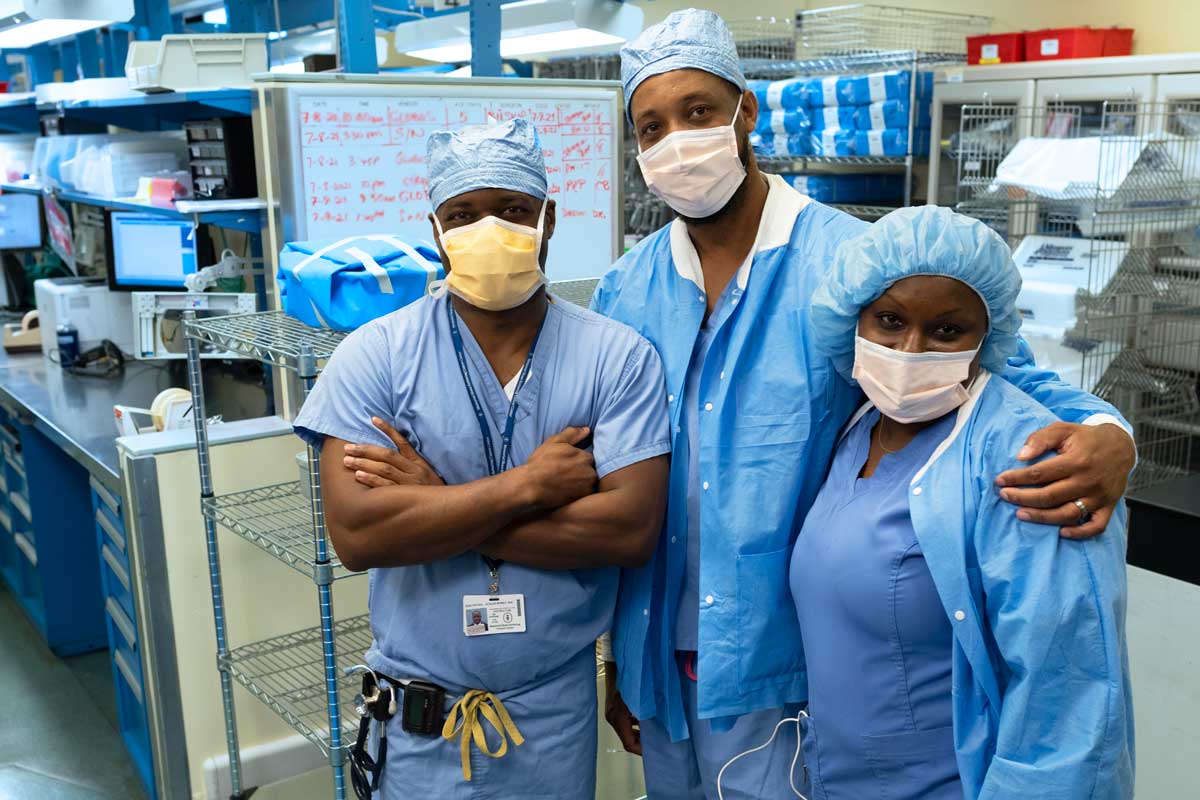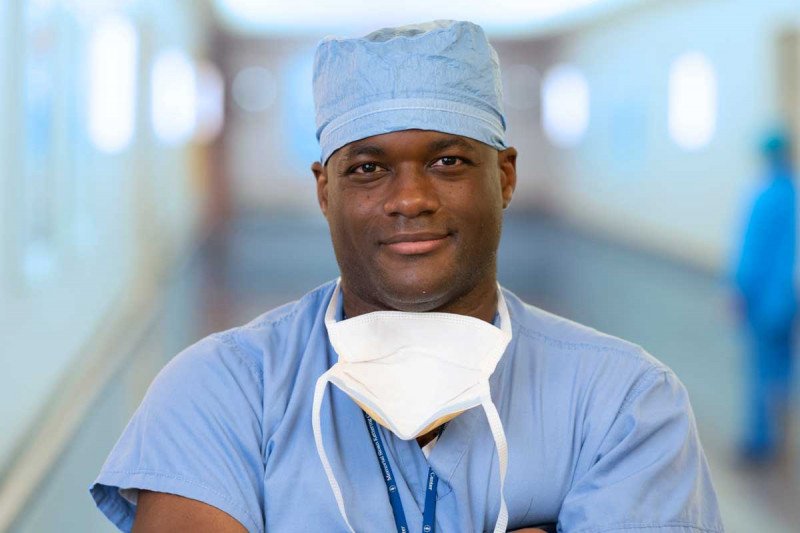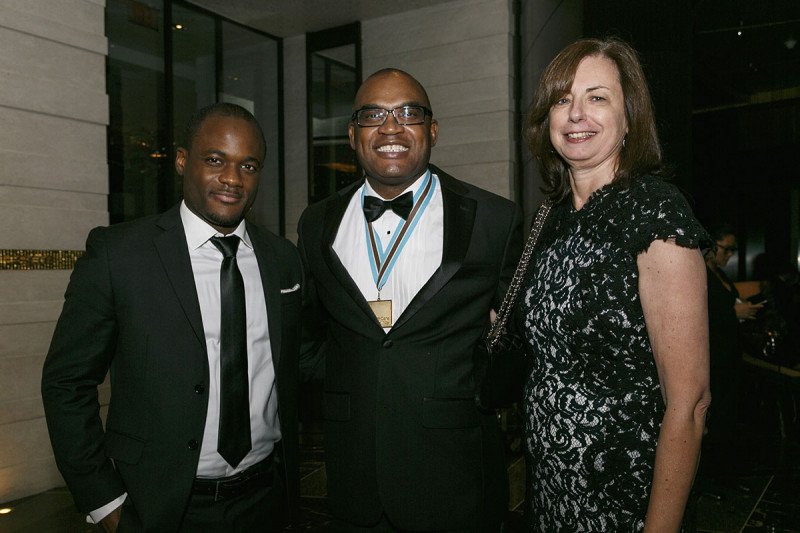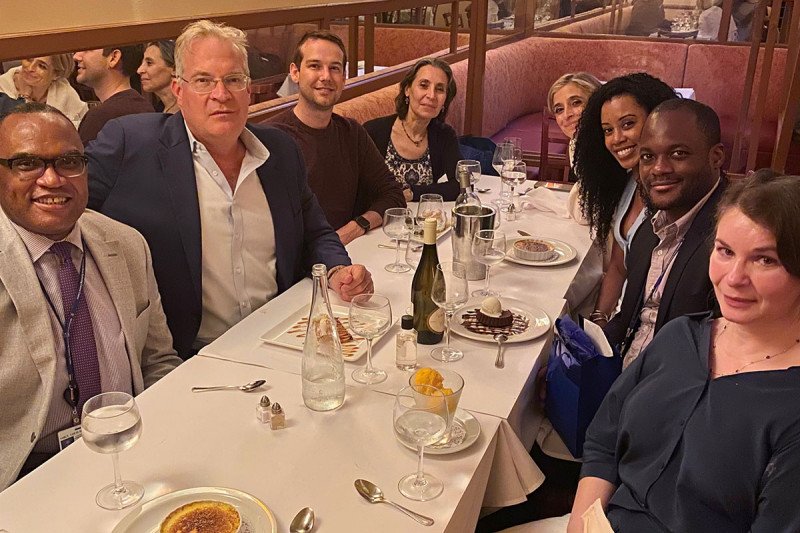It would be tough to find a more unconventional path to becoming a doctor at a renowned cancer center than the one taken by Borel Soh.
And perhaps even harder to find a path that is more inspiring.
His journey starts in the Central African nation of Cameroon, winds through a car wash in the Bronx, picks up speed in community colleges, and takes flight in the basement of Memorial Sloan Kettering Cancer Center (MSK), where an immigrant who arrived in New York City speaking almost no English pursued an improbable dream.
The Power of Healing
To understand the doctor he is today, we must first meet him when he was very young — and faced a medical emergency.
As a child, says Dr. Soh, “I was fascinated with airplanes. Some of my earliest memories were of wanting to be a pilot.” But he believes his life took an important turn when he was rushed to the hospital in Yaoundé, Cameroon, with a ruptured appendix at just 6 years old.
A surgeon from Italy was visiting the hospital where Dr. Soh was taken and performed the operation that Dr. Soh believes saved his life. When he woke up after surgery, “I was perplexed by the beeping machinery around me, which I now recognize as an EKG and a pulse oximeter. For a child obsessed with airplanes, it was very impressive.”
An even bigger impression was made as he recovered in the hospital. “My mom talked to the doctors each day as they visited me. As my health improved, my mom’s smile became brighter and brighter. I remember thinking: ‘I want to be one of these people who make people happy and bring healing.’ That was when I decided I wanted to pursue medicine.”
Working Around the Clock
Dr. Soh finished high school in Cameroon and thought New York City was the perfect place to continue his education. But when he arrived, he realized, “There was a barrier — the first of many. I couldn’t really hold a conversation in English. The reality was I just didn’t speak English.”
He enrolled in an English language education class, determined to get to college. Like so many immigrants, he made the most of the resources at hand. “When I saw captions on TV, it was like I’d found a goldmine. I could read along and learn how to pronounce words.”
He was also enthralled by New York’s public libraries. “I read three books a week, on every topic I thought could help me.”
But he also badly needed to make money. “My first job was at a car wash in the Bronx. I lived in Brooklyn, so six days a week I would take the subway at 4:30 in the morning to work.” Soon, he says, “I took jobs anywhere I could. I worked at a restaurant in Brooklyn. I stocked shoes.” Often, he worked jobs nearly around the clock to make ends meet.

College Days
He also enrolled in the City University of New York system. He started at Brooklyn’s Medgar Evers College and eventually transferred to City College in Manhattan.
To further his dream of becoming a doctor, he applied for jobs at hospitals. But he didn’t get any responses until a fellow student he tutored in physics told him she was working at MSK. Through his physics trainee, Dr. Soh met John Meggs, a manager in MSK’s Central Processing Department. When Dr. Soh was offered a job, he began working in the basement of MSK’s hospital in Manhattan.
‘One of My Biggest Breaks’
While the Central Processing Department might be unfamiliar to most, the role they play at hospitals like MSK is absolutely vital. Dr. Soh explains that “my job was to clean and sterilize all the equipment like retractors and endoscopes that are used during surgery so they are ready to be used again. We delivered trays of sterilized surgical instruments each day to operating rooms.”
Dr. Soh calls the job “one of the biggest breaks of my life.” But working while attending college required a prodigious work ethic. Dr. Soh worked the graveyard shift, beginning at MSK at and stretching to Immediately after his shift, he ran to catch a bus and then a subway to get to college for a full day of classes. Each evening, he caught a few hours of sleep before studying and returning to his overnight shift at MSK.
Making Connections
He kept up this grueling pace for three years. He recalls: “When I delivered trays of surgical instruments to operating rooms, I could just imagine myself being a doctor, and thought how great it would be to practice medicine at MSK.”
As he worked, he made connections among MSK care teams, including nurses and doctors. Eventually, he shared his dream of becoming a doctor. “People didn’t just tell me, ‘Good luck,’” he says. “People said, ‘OK, here’s what you need to do.’ They were willing to invest their time and effort. And they gave me confidence that if I put in the work and was willing to make sacrifices, I could become a doctor.”
Mentors at MSK
Dr. Soh found mentors across MSK. Among them was Kathryn Martin, MSK’s Chief Operating Officer. They met at a panel discussion for college students in 2011, during which she was impressed by his insightful questions. Looking back, Dr. Soh says, “I did not anticipate someone in her position would truly care for my success.”
Kathryn Martin introduced Dr. Soh to MSK physicians, including Louis Voigt, who specializes in critical care. Dr. Soh calls Dr. Voigt “a phenomenal mentor” who “helped me get the information I needed. Aspirations aren’t enough — you need information to create the bridge to actual achievement. Dr. Voigt really helped.”
Dr. Soh was also encouraged by Neil Halpern, the director of MSK’s Critical Care Center. “He helped me put together my medical school application. They were all instrumental — along with so many others at MSK — in helping me take the next step in becoming a doctor.”
The 14-Year Plan
During medical school at SUNY Downstate College of Medicine in Brooklyn, Dr. Soh discovered a passion for anesthesiology. “I always knew I wanted to work in the operating room setting, based on my personal history. I found that with anesthesiology, I really appreciated seeing the immediate effect of your action in someone’s health, whether it’s putting someone under general anesthesia or rescuing them in an emergency setting.”
Dr. Soh returned to MSK during breaks from med school for research programs. In the final year of his residency, he returned to MSK for a six-week rotation. That segued into a one-year fellowship in perioperative medicine and onco-anesthesia.
In 2021, Dr. Soh had a conversation with Gregory Fischer, Chair of the Department of Anesthesiology and Critical Care and a “superb teacher”: “He told me he was pleased with my work,” says Dr. Soh. “And he asked me to come on board as junior faculty.”
It was the culmination of a dream. “I started working at MSK in 2007,” says Dr. Soh. “For me, this was a 14-year plan that came to fruition. I am very excited.”
Life Today
Today, life for Dr. Soh looks very different than when he first started working at MSK. He and his wife, Christine, have three young children. He is a passionate New York sports fan. Sometimes, he says, “I like to relax by watching anime,” the Japanese cartoon and animation genre that he happily admits many adults find baffling, including his wife.
He has also contemplated taking flying lessons, a return to the childhood obsession he set aside in favor of medicine.
‘A Transfer of Knowledge’
As Dr. Soh embarks on the newest phase of his medical career, he is characteristically thinking about his next goal. He says, “Remember, a visiting surgeon from Italy may be the reason I’m alive today. I would like to do medical missions in Cameroon and other developing countries, both as a doctor and as an educator.”
Dr. Soh explains that “what I hope to achieve in my career is a transfer of knowledge. At MSK, so many people helped transfer knowledge to me. I want to keep doing that for other people.”
And he believes that dynamic can start anywhere. “I hope people read about my story and are inspired by it. Even more, I hope people think about how many more potential stories there are like mine.”
He continues, “Providing a helping hand to people around you can change someone’s trajectory in life. I know because it’s happened to me.”






